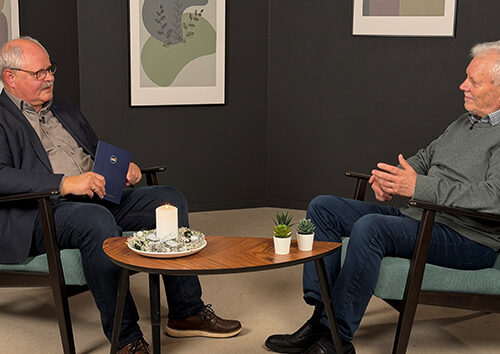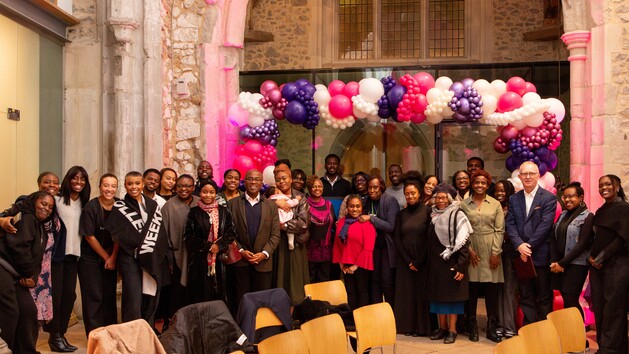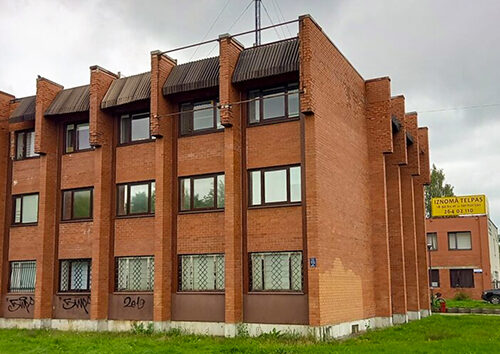5 August 2013 Novi Sad, Serbia [Agnieszka Kluska, tedNEWS] David Asscherick is co-director of Light Bearers and co-founder of ARISE. A former extreme sports enthusiast and punk rocker, David turned his life over to the God of the Bible at the age of 23. He has spent the last 15 years travelling the globe preaching and teaching the gospel of Jesus Christ. He is the author of God In Pain: Another Look at Evil, Suffering, and the Cross, his first book. He and Violeta, his wife of 13 years, are the happy parents of two boys, Landon and Jabel. They enjoy backpacking, climbing, running, fly fishing, and reading.
tedMEDIA: How are you enjoying the Congress and what were your expectations before you came?
David Asscherick: To be honest my expectations were that I would have a lot more free time because when I looked at the schedule I was thinking, oh you know I’m only teaching on Wednesday and Thursday so I’ll have all day Friday and Sabbath. But there have been so many wonderful young people here that I’ve just been literally uninterruptedly non-stop talking to people and I love that.
I had high expectations before I came and those expectations have almost entirely been met.
tedMEDIA: Have you met many new people or are these old friends that you’re meeting?
David Asscherick: I have met a tone of new friends here and I’ve connected with some old friends as well. There’s several ARISE students here. One of my favourite things in life is to meet new people, just to get to know them, sit down, hang out, and I’ve met just a lot of new people.
tedMEDIA: Your message on Thursday was powerful. And the energy was just infectious. Where do you get it from? Everyone is asking about that!
David Asscherick: A lot of people are asking me about that! I think it’s from striving to live a healthy life. I just turned 40 this year and I feel great. I feel as good as I‘ve ever felt. I love to run, in fact I just went for a run a couple of days ago here in Novi Sad. I eat well, I try to get to bed at a reasonable time and I love running, climbing, surfing; I’ve always been very active. I just love it.
tedMEDIA: Do you tailor your style of preaching to the audience? Is it different when you speak to adults?
David Asscherick: No, this is how I preach. This is who I am. In fact, when I’m at home playing with the kids or just acting crazy, my wife will say: “If people only knew what you’re really like. ” And then she’ll say: “Wait a minute, they do! ” This is who I am. When I stand up there I just know the major points that I want to say, and to be honest, even many of the things, like getting down on my four legs and acting like a dog, I didn’t plan that beforehand. I was just going to talk about the stability of the tripod and then it dawned on me, I could talk about the difference between a two-legged animal, namely a human being, and a four-legged animal, so I just said: “I’ll get down on my hands and knees”.
So a lot of that stuff just comes, in fact, most of it. Not the theological content, which I have really thought through, but the delivery is almost entirely spontaneous.
tedMEDIA: You’ve travelled the world and you’ve done all kinds of things like workshops, seminars, Bible boot camps and conferences. What do you think works best for the youth to keep them focused and inspired, not just for a short while?
David Asscherick: For me 100% the thing that works both short term and long term is getting young people two things: in the Word and really connected to Christ and ministry. That’s it. Don’t get me wrong. I love good production and I think they’ve done a fantastic job but what if you had all of this beautiful production without substance? The production can’t sustain an ongoing enthusiasm. You have to connect people to the Word, to Christ and to ministry. And when that happens, young people, like anybody, whether you’re 20, 30, 40, 50, 60; people turn on, the switch is flipped. So ‘yes’ to good music, ‘yes’ to good drama, ‘yes’ to good production, but if you don’t have good substantive teaching and preaching and workshops, you can’t generate enough power or ethusiasm in those things to sustain. Here’s what I tell people: “Content and charisma together are great. But if you have to choose one, choose content.” What they have been able to pull off here very nicely is an excellent mixture of both content and charisma. But if all we have is charisma in terms of our presentation, it’s not enough to really keep people. It’s like eating dessert; it can give you energy for a shor time, but if you didn’t eat the meal, you don’t have ongoing sustanance.
tedMEDIA: You are a role model for young people. Lots of them follow you on Facebook or Twitter. Is there anyone that you look up to?
David Asscherick: Yes, absolutely. Some of them are here. The people that I really listen to in the church are people like Matt Parra, Nathan Renner, James Rafferty, Ty Gibson, Jeffrey Rosario and many others. In fact many of my best ideas in sermons or workshops or other things come straight from them. I consider myself, and I am, a very collaborative person. Many people might not know that. They might think, David is kind of a loner by himself, but it‘s quite the opposite. I have never not worked with a team. I’ve always been with a team. I love collaboration, I love synergy, I love connecting with other people so there’s tones of people both in the Adventist church and outside of the Adventist church that I look up to very much.
tedMEDIA: You did a seminar on the prophetic identity of the Seventh-day Adventist Church. Do you think there is a need to rebuild the identity among the youth. If so, in what way?
David Asscherick: We don’t need the identity rebuilt but we need it understood. Maybe reimagined in some senses. For example, we hear a lot about the remnant church and I support that emphasis but we need to hear even more about the remnant message. I think young people are not exactly sure what to do with that idea of the remnant church. Does that mean we’re the only church, does that mean my friends who are Babtists or Anglicans or Catholics are not real Christians? No. The real emphasis in the Bible in terms of the remnant is on the message of the remnant; the truth of the remnant. The remnant as an institution is important, but our identity is not in a cultural, ecclesiastical institution; it’s in Christ and in the message that we preach. So does it need to be rebuilt? No. Does it need to be believed and understood? Yes. Does it need to be re-envisioned a little bit? Yes, probably. Because many people perceive it incorrectly and unbiblically and we should think of it in terms of the message content rather than, now you’re a member of this institutional ecclesiastical body, now you’re in. No. It’s about being connected to Christ and to His word.
tedMEDIA: Friday was all about making a difference in Novi Sad. Did you join the Impact Day?
David Asscherick: Yes, my participation was fairly modest because I’m a photographer and I wanted to go out and get pictures of the city and pictures of some of the young people interacting. We were right downtown here with a group that was giving out water bottles. It was a fairly modest outreach effort, not unimportant, but I was able to get some pictures that I was happy with. Frankly, at the site that I was at, they had way more people helping than they had need of, so I was a bit of a fifth wheel, as we say in the States. If I hadn’t gone downtown to the group that interested me the most, I would have wanted to go along the Danube river and pick up things. I’m very passionate about biblical ecology and I just recently spent some time in another eastern European country and I was really discouraged with how much trash there was everywhere. It’s very different where I’m from in the United States. You just wouldn’t see that what we call litter and so that’s the thing that would have realy interested me.
tedMEDIA: How do you find the balance between reaching out to those who have never met Christ and catering for the needs of the church family? What’s your main focus?
David Asscherick: That’s a great question. It depends year to year. Sometimes I find myself speaking more in house to the Seventh-day Adventist congregations and gatherings and other times my meetings are almost exclusively to the public. To be honest if I had to choose between one or the other, I would choose to preach to the public. Just like Paul said, I’d rather go built where there’s no foundation, where the name of Christ is not named, than build on somebody else’s foundation. I like a good mix. If I could choose a ratio of 2:1; two public meetings to one Adventist meeting, that would be ideal for me. Whether I’m preaching to so called Adventists who already know the Lord; many of whom don’t, many of whom do, or people who don’t know the Lord at all, I just love to preach Christ and whoever is willing to listen, I am willing to speak.
tedMEDIA: What should be the focus of the Adventist youth?
David Asscherick: I think that the number one thing that Adventist young people need to concentrate on is being really connected with Scripture and really connected with the ministry of Christ. Being involved, not just in the wordy way but in an actual, physical, relationally significant way. Bring the ministry of Christ into the university, into the workplace, into their family. This is the only thing that has the ability to sustain us; the Word and ministry. Apart from that, religion is largely just a club, it’s a social gathering, it’s a show. But with those things, if that can become an emphasis and a priority, then the sky is the limit.
tedMEDIA: You are a frequent visitor to Europe. What is the biggest challenge in your opinion that we are facing as youth here on this continent? Is there anything that puts us in a better position or worse position as compared to youth on other continents?
David Asscherick: I think there are several struggles in Europe but the two I will speak about here is – number one: many of the countries here are very secular – but I think even worse than that is that the church in the past had a kind of resignation to the fact. „Oh I live in a secular country, oh it’s so hard here“. But don’t you serve an infinitely powerful God, don’t you serve the Lord of glory? So is there a problem with secularity and getting access to people? Yes. Has the church exacerbated the problem sometimes and just spent so much time talking about it and worrying about it and discussing it? I think that has been at least as much of the problem. Let’s just say everywhere is hard. We live in a world that is hostile to the gospel. Let’s get to work. We don’t find Paul in the New Testament saying „man, Corinth is tough. And Galtia, oh really..“ No! Let’s do what we can and make a difference.
tedMEDIA: Is there any country that you’d still like to visit or is there any region that God put on your heart?
David Asscherick: Yes, of course, every country! I want to go to every country I’ve not been to, every single one. Some people when they go to a restaurant and they get a good meal, they always order the same thing. I’m a little bit that way. I went to New Zealand and I was like, this is the best country on Earth! And then I went back five years in a row. And I’ve been to Australia like five years in a row and I’ve been to Sweden numerous times, to Norway numerous times. I’m torn because when I go to a place and have a really good experience, I just want to go back. So I want depth, but I also want to go to new places as well, so I want breadth. Is there an area that I really am passionate about? Yes, to be honest right now it’s the Mediterranean. I’d love to spend time in Italy, Macedonia, Greece. The Middle East is really intriguing. I was just in Turkey for the first time a couple of weeks ago. You pretty much couldn’t name a place on the Earth that I would not be passionate about going. At least for a short time.
tedMEDIA: When do we see you next in Europe?
David Asscherick: I’ve got a lot of invitations to come back next year but right now, to be honest, my family and I are contemplating taking a call to pastor a church in Australia and we’re kind of looking at settling down because our boys are just coming into their teen years and we really want them to have a good, stable, local church situation for next 5-7 years. So if I take that call, I will probably be travelling only two or three months out of the year, as opposed to six. So I would say there’s a 100% chance I’ll be back in Europe next year, but where exactly remains to be seen. [tedNEWS]
tedNEWS Staff: Miroslav Pujic, director; Deana Stojkovic, editor
119 St Peter’s Street, St Albans, Herts, AL1 3EY, England
E-mail: [email protected]
Website: www.ted-adventist.org
tedNEWS is an information bulletin issued by the communication department of the Seventh-day Adventist Church in the Trans-European Division.
You are free to re-print any portion of the bulletin without need for special permission. However, we kindly request that you identify tedNEWS whenever you publish these materials.


